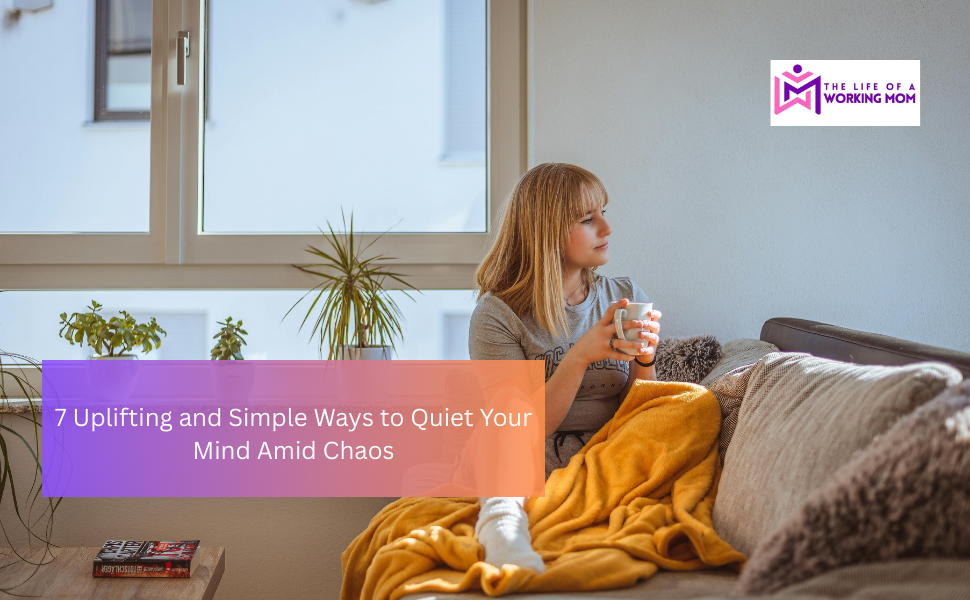Table of Contents
Introduction
Life as a mom often feels like managing a thousand thoughts at once. Between family needs, work responsibilities, and personal commitments, it can be hard to find a moment of mental quietness. Yet, carving out even small pockets of calm is essential for your well-being. Quieting your mind is not about eliminating every thought but about finding simple ways to quiet your mind and create space for peace, even in the midst of chaos.
A quiet mind is not a luxury; it’s a lifeline. In the whirlwind of motherhood, where multitasking is constant and emotional demands run high, mental stillness becomes a form of self-preservation. It’s the difference between reacting with frustration and responding with grace. These simple ways to quiet your mind are not about perfection; they’re about creating breathing room for your soul to catch up with your body.
1. Practice Mindful Breathing

Mindful breathing is one of the most accessible ways to quiet your mind. It doesn’t require special equipment or a long meditation session. Simply taking slow, intentional breaths; inhaling through your nose, holding for a few seconds, and exhaling gently through your mouth, can shift your nervous system from stress to calm. This practice brings your attention to the present moment and helps interrupt racing thoughts.
Over time, mindful breathing becomes a powerful anchor. When practiced regularly, it teaches your body how to return to calm more quickly after moments of stress. Whether you’re dealing with a toddler meltdown, a work deadline, or a difficult conversation, your breath becomes a reliable tool for grounding and clarity. It’s a way to pause, reset, and respond with intention.
You can incorporate mindful breathing into your daily routine in simple ways. Try it while waiting in line, before responding to a stressful message, or during your morning coffee. These small moments of breath awareness build emotional resilience and create a rhythm of renewal throughout your day.
2. Create a Calm Environment
Your physical environment has a direct impact on your mental state. When your surroundings are cluttered, noisy, or overstimulating, your thoughts often mirror that chaos. Creating a calm space,even a small corner in your home can help signal to your brain that it’s time to relax. This space doesn’t need to be elaborate; a cozy chair, a soft blanket, or a quiet nook by the window can make a big difference.
Sensory elements play a key role in shaping your environment. Soft lighting, soothing scents, and gentle sounds can all contribute to a sense of peace. Consider adding a plant, lighting a candle, or playing calming music to create a sanctuary that invites stillness. These subtle touches help your mind slow down and settle into the present.
Over time, your mind begins to associate this space with calm. When you step into it, your body knows it’s safe to let go. This is especially important for moms who rarely get uninterrupted time alone. Having a designated retreat, even for just five minutes, can restore your energy and help you reconnect with yourself.
3. Let Go of Mental Clutter

Mental clutter often comes from trying to hold too many thoughts at once. From to-do lists and worries to unfinished conversations and self-doubt, these thoughts swirl endlessly unless given a place to land. Writing them down in a journal or notebook can be a powerful way to release that weight. It’s not about solving everything; it’s just about clearing space in your mind.
Letting go also means setting boundaries. Saying “no” to commitments that drain you is an act of self-care. When you protect your time and energy, you reduce the number of thoughts competing for your attention. This creates room for clarity, focus, and peace. You don’t have to do it all, and you don’t have to carry it all alone.
Another layer of mental clutter comes from harsh self-talk. Replaying mistakes or worrying about what you didn’t finish keeps you stuck in a cycle of guilt and anxiety. Practicing self-compassion and speaking to yourself with kindness and forgiveness helps release these burdens. When your inner voice becomes gentler, your mind becomes quieter.
4. Build Micro-Moments of Stillness
Quieting your mind doesn’t require long stretches of time. Micro-moments, brief pauses throughout your day, can be just as powerful. These are the moments when you sip tea in silence, step outside for fresh air, or simply close your eyes and breathe. They act as reset buttons, helping you shift gears mentally and emotionally.
These small pauses are especially helpful during transitions. Before moving from one task to another, take a moment to breathe and center yourself. After a stressful interaction, pause to reflect and release tension. These micro-moments create space between the chaos, allowing you to respond with clarity rather than react out of overwhelm.
Over time, these pauses become part of your rhythm. They help you stay grounded, even when life feels unpredictable. By building stillness into your day, you create a lifestyle that supports peace. These moments may be brief, but their impact is lasting.
5. Connect with Supportive People

Connection is a powerful antidote to mental overwhelm. Talking to someone you trust, a partner, friend, or fellow mom can help lighten your emotional load. Sharing your thoughts out loud often brings clarity and reassurance. It reminds you that you’re not alone in your struggles.
Supportive relationships also foster emotional safety. When you feel seen and heard, your mind relaxes. You don’t have to carry everything by yourself. Whether it’s a quick check-in or a deep conversation, these moments of connection restore your sense of belonging and calm.
Community matters too. Joining groups, whether online or in person, helps you feel part of something larger. Sharing experiences with others creates solidarity and encouragement. And giving support to others through a kind word or a listening ear often brings peace to your own heart.
6. Use Evening Rituals to Unwind

Evening rituals help you transition from the busyness of the day into rest. They signal to your mind and body that it’s time to slow down. Whether it’s journaling, prayer, stretching, or reading, these practices create a rhythm of closure and calm. They help you release the day’s tension and prepare for sleep.
These rituals also offer space for reflection. You can process your emotions, celebrate small wins, and let go of lingering stress. Instead of carrying unresolved thoughts into the night, you gently lay them down. This makes room for deeper rest and emotional renewal.
Consistency is key. When you repeat these rituals regularly, they become part of your natural rhythm. Your mind begins to anticipate and welcome the stillness. Over time, these practices not only improve sleep but also enhance your overall emotional balance.
7. Bring Nature Into Your Space

Nature has a calming, grounding effect on the mind. Even small touches, like a plant on your desk, an open window, or a walk outside, can shift your mental state. Nature reminds us of rhythm, simplicity, and beauty. It helps us slow down and reconnect with the present.
Exposure to natural elements reduces stress and restores clarity. Watching leaves sway, hearing birds chirp, or feeling sunlight on your skin activates your senses in a gentle way. These experiences soothe your nervous system and create a sense of peace.
You don’t need to live near a forest to benefit. Bringing nature indoors through natural textures, earthy colors, or fresh air can transform your environment. These subtle shifts invite calm and help your mind feel more spacious and alive.
Why a Quiet Mind Matters
When your mind is racing, it’s harder to focus, make decisions, or connect with others. Constant mental noise leads to stress, irritability, and burnout. A quiet mind helps you respond rather than react, making you more patient and present. It also enhances your ability to notice small joys, like a child’s laughter or a warm meal, deepening your sense of gratitude and enriching everyday life.
Quieting your mind also nurtures your identity. Amid the demands of motherhood, it’s easy to lose sight of your own voice. Stillness helps you reconnect with yourself, not just as a caregiver, but as a woman with dreams, values, and inner wisdom.
In a world that constantly demands your attention, a quiet mind becomes a form of resistance. It’s a way of reclaiming your peace, your power, and your presence. It allows you to live with intention rather than reaction, and to lead your family with grace.
The Benefits of a Quiet Mind
Reduced Stress and Anxiety: A quiet mind lowers the intensity of stress and helps you feel more centered. You’re able to approach challenges with a sense of calm rather than panic. This emotional steadiness makes daily life more manageable and less overwhelming.
Improved Sleep Quality: When your thoughts settle before bed, it’s easier to drift into restful sleep. You wake up feeling refreshed and more energized. Better sleep also improves your mood, focus, and physical health.
Greater Emotional Balance: Quieting your mind creates space for reflection rather than reactivity. You’re able to handle frustrations with more patience and less tension. This emotional regulation strengthens your relationships and your sense of self
Simple Practices for Everyday Calm
Quieting your mind does not have to take hours; it can be built into small daily practices. Try listening to calming music, enjoying a warm cup of tea in silence, or spending a few minutes outside in nature. Even small pauses throughout your day can create powerful moments of peace.
You may also find it helpful to build in evening rituals such as journaling, prayer, or stretching. These practices not only quiet the mind but also set the stage for better rest. By repeating them consistently, they become part of your natural rhythm of renewal.
When practiced regularly, these small actions grow into habits that naturally calm your thoughts. Over time, they add up to a lifestyle that supports peace, making quiet moments an ordinary and expected part of your day.
Final Thoughts
In the midst of motherhood and life’s constant demands, it is essential to give your mind the quiet it longs for. Small steps like mindful breathing, releasing mental clutter, and creating calming spaces can open the door to peace within. While a quiet mind cannot take away every challenge, it provides the resilience and clarity to move through them with strength and grace.
When your mind is calm, you’re able to show up more fully for yourself, your children, and your purpose. You begin to notice the beauty in ordinary moments, the joy in small victories, and the strength in your own resilience. These practices are not just tools for stress relief; they are pathways to deeper presence, emotional clarity, and authentic connection
If you’d like more encouragement on finding balance as a mom, you can read Balancing It All: How Moms Can Manage School, Work, and Family Life. To further support your journey toward mindfulness, the American Psychological Association’s Mindfulness Guide offers helpful tools and practices.


